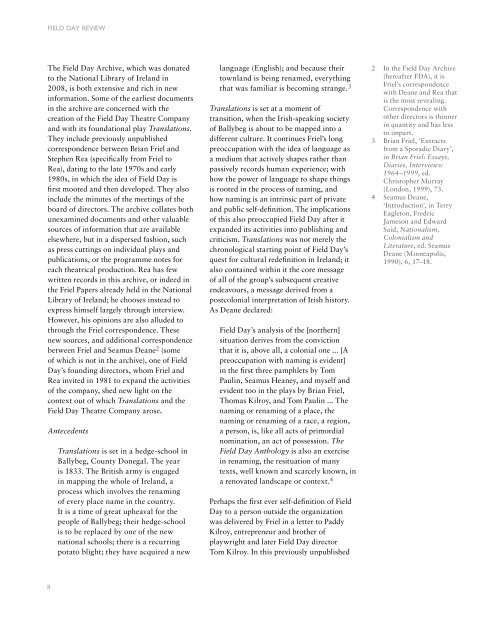cd on translations
cd on translations
cd on translations
You also want an ePaper? Increase the reach of your titles
YUMPU automatically turns print PDFs into web optimized ePapers that Google loves.
FIELD DAY REVIEW<br />
The Field Day Archive, which was d<strong>on</strong>ated<br />
to the Nati<strong>on</strong>al Library of Ireland in<br />
2008, is both extensive and rich in new<br />
informati<strong>on</strong>. Some of the earliest documents<br />
in the archive are c<strong>on</strong>cerned with the<br />
creati<strong>on</strong> of the Field Day Theatre Company<br />
and with its foundati<strong>on</strong>al play Translati<strong>on</strong>s.<br />
They include previously unpublished<br />
corresp<strong>on</strong>dence between Brian Friel and<br />
Stephen Rea (specifically from Friel to<br />
Rea), dating to the late 1970s and early<br />
1980s, in which the idea of Field Day is<br />
first mooted and then developed. They also<br />
include the minutes of the meetings of the<br />
board of directors. The archive collates both<br />
unexamined documents and other valuable<br />
sources of informati<strong>on</strong> that are available<br />
elsewhere, but in a dispersed fashi<strong>on</strong>, such<br />
as press cuttings <strong>on</strong> individual plays and<br />
publicati<strong>on</strong>s, or the programme notes for<br />
each theatrical producti<strong>on</strong>. Rea has few<br />
written records in this archive, or indeed in<br />
the Friel Papers already held in the Nati<strong>on</strong>al<br />
Library of Ireland; he chooses instead to<br />
express himself largely through interview.<br />
However, his opini<strong>on</strong>s are also alluded to<br />
through the Friel corresp<strong>on</strong>dence. These<br />
new sources, and additi<strong>on</strong>al corresp<strong>on</strong>dence<br />
between Friel and Seamus Deane 2 (some<br />
of which is not in the archive), <strong>on</strong>e of Field<br />
Day’s founding directors, whom Friel and<br />
Rea invited in 1981 to expand the activities<br />
of the company, shed new light <strong>on</strong> the<br />
c<strong>on</strong>text out of which Translati<strong>on</strong>s and the<br />
Field Day Theatre Company arose.<br />
Antecedents<br />
8<br />
Translati<strong>on</strong>s is set in a hedge-school in<br />
Ballybeg, County D<strong>on</strong>egal. The year<br />
is 1833. The British army is engaged<br />
in mapping the whole of Ireland, a<br />
process which involves the renaming<br />
of every place name in the country.<br />
It is a time of great upheaval for the<br />
people of Ballybeg; their hedge-school<br />
is to be replaced by <strong>on</strong>e of the new<br />
nati<strong>on</strong>al schools; there is a recurring<br />
potato blight; they have acquired a new<br />
language (English); and because their<br />
townland is being renamed, everything<br />
that was familiar is becoming strange. 3<br />
Translati<strong>on</strong>s is set at a moment of<br />
transiti<strong>on</strong>, when the Irish-speaking society<br />
of Ballybeg is about to be mapped into a<br />
different culture. It c<strong>on</strong>tinues Friel’s l<strong>on</strong>g<br />
preoccupati<strong>on</strong> with the idea of language as<br />
a medium that actively shapes rather than<br />
passively records human experience; with<br />
how the power of language to shape things<br />
is rooted in the process of naming, and<br />
how naming is an intrinsic part of private<br />
and public self-definiti<strong>on</strong>. The implicati<strong>on</strong>s<br />
of this also preoccupied Field Day after it<br />
expanded its activities into publishing and<br />
criticism. Translati<strong>on</strong>s was not merely the<br />
chr<strong>on</strong>ological starting point of Field Day’s<br />
quest for cultural redefiniti<strong>on</strong> in Ireland; it<br />
also c<strong>on</strong>tained within it the core message<br />
of all of the group’s subsequent creative<br />
endeavours, a message derived from a<br />
postcol<strong>on</strong>ial interpretati<strong>on</strong> of Irish history.<br />
As Deane declared:<br />
Field Day’s analysis of the [northern]<br />
situati<strong>on</strong> derives from the c<strong>on</strong>victi<strong>on</strong><br />
that it is, above all, a col<strong>on</strong>ial <strong>on</strong>e ... [A<br />
preoccupati<strong>on</strong> with naming is evident]<br />
in the first three pamphlets by Tom<br />
Paulin, Seamus Heaney, and myself and<br />
evident too in the plays by Brian Friel,<br />
Thomas Kilroy, and Tom Paulin ... The<br />
naming or renaming of a place, the<br />
naming or renaming of a race, a regi<strong>on</strong>,<br />
a pers<strong>on</strong>, is, like all acts of primordial<br />
nominati<strong>on</strong>, an act of possessi<strong>on</strong>. The<br />
Field Day Anthology is also an exercise<br />
in renaming, the resituati<strong>on</strong> of many<br />
texts, well known and scarcely known, in<br />
a renovated landscape or c<strong>on</strong>text. 4<br />
Perhaps the first ever self-definiti<strong>on</strong> of Field<br />
Day to a pers<strong>on</strong> outside the organizati<strong>on</strong><br />
was delivered by Friel in a letter to Paddy<br />
Kilroy, entrepreneur and brother of<br />
playwright and later Field Day director<br />
Tom Kilroy. In this previously unpublished<br />
2 In the Field Day Archive<br />
(hereafter FDA), it is<br />
Friel’s corresp<strong>on</strong>dence<br />
with Deane and Rea that<br />
is the most revealing.<br />
Corresp<strong>on</strong>dence with<br />
other directors is thinner<br />
in quantity and has less<br />
to impart.<br />
3 Brian Friel, ‘Extracts<br />
from a Sporadic Diary’,<br />
in Brian Friel: Essays,<br />
Diaries, Interviews:<br />
1964–1999, ed.<br />
Christopher Murray<br />
(L<strong>on</strong>d<strong>on</strong>, 1999), 73.<br />
4 Seamus Deane,<br />
‘Introducti<strong>on</strong>’, in Terry<br />
Eaglet<strong>on</strong>, Fredric<br />
James<strong>on</strong> and Edward<br />
Said, Nati<strong>on</strong>alism,<br />
Col<strong>on</strong>ialism and<br />
Literature, ed. Seamus<br />
Deane (Minneapolis,<br />
1990), 6, 17–18.


